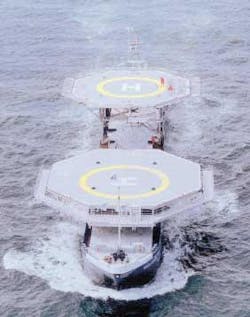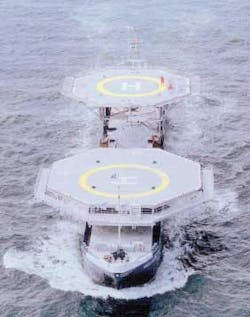Dutch contractors chasing new opportunities in Caspian, Brazil, Africa
Jeremy Beckman
Editor, Europe
Business prospects throughout the main offshore sectors look generally sound for Dutch contractors. The one worrying exception is their own back yard, due to the government's refusal to backtrack on negative taxation measures. These could jeopardize future E&P investments across the Dutch shelf.
In these circumstances, the country's resourceful suppliers may have to look farther afield to sustain oil and gas sector incomes. The Association of Dutch Suppliers in the Oil and Gas Industry (IRO), led by Managing Director Hans de Boer, is spearheading these efforts. IRO is best known for organizing the Dutch pavilion at the major offshore exhibitions. It also mounts missions to emerging oil and gas provinces, giving its members access to influential state-run companies.
At home, seemingly no amount of influence can shake the government's resolve to remove "depreciation at will." This measure, introduced in 1998, was designed to encourage exploration and development by allowing operators to write off certain levels of capital expenditure. Coincidentally, other reforms were pushed through, including participation of the state (through state oil company EBN) in exploration from the outset, further reducing the cost burden on the operator.
These changes, allied to higher oil prices, helped stimulate field activity on the Dutch shelf. But The Netherlands as a whole was suffering from the global recession, leading to across-the-board budgetary cuts at home. The oil and gas sector was seen as a soft target for ramping up government revenues, hence last year's announcement of the new measures.
The new administration has subsequently endorsed the measures despite warnings from operators association Nogepa that around 40 new projects will be shelved, corresponding to ¤780 million of "lost" investments.
Since Jan. 1, 2003, depreciation at will is no longer applicable. According to De Boer, "The government says it wants time to evaluate the impact of this change. But what they are doing will only bring tax monies forward. There will be no actual extra income. They say the oil industry in general is doing very well, so oil companies don't need special tax dispensations. But they forget that the Dutch continental shelf is not of great interest now to the big operators. They can go elsewhere for their exploration."
In the Dutch sector of the North Sea, exploration levels have been poor of late, and future prospects are not very good, De Boer says. "We have a mature infrastructure in place, but with no expectations for major discoveries, so all new developments will be marginal fields."
Slowdown in activity
Even this size of investment could prove unattractive to operators following abolition of depreciation at will. The resulting slowdown in activity has already led to three IRO members going bankrupt this year, De Boer says, due to their reliance on the home market.
On the plus side, there has been an influx of independents into the Dutch sector, mirroring trends in the UK and Norway. The newest operators are ATP from Houston and Denmark's Denerco.
null
"These smaller companies will likely take over the smaller operations," he believes. "We know that both BP and Shell are considering selling some of their smaller assets." Whether this sparks a new long-term phase of activity remains to be seen.
Also uncertain is the impact on suppliers of Shell's recent reorganization decision. New operational centers are being established in Assen, northern Holland, Aberdeen, and Stavanger to manage respectively southern North Sea (UK and Dutch), northern UK, and Norwegian offshore activities.
"Probably we won't gain or lose," De Boers says, "although there could be an advantage for our suppliers going to Assen for all southern sector tenders. Also, NAM – the joint Shell & ExxonMobil venture – has decided to run all their tenders from Jan.1, 2004, through First Point Assessment Ltd. We are talking to FPAL about a form of cooperation, with IRO acting as a local agent, handling its relations with Dutch service companies. This in turn should give our suppliers greater access to Shell's operations in the rest of the UK and Norway."
A further potentially positive development could be the planned second gas line between The Netherlands and the UK. State distributor Gasunie recently invited bids for capacity in a proposed 235-km pipeline across the North Sea between Balgzand and Bacton. This could benefit specialist contractors in pipelay, trenching, and dredging such as Allseas, Boskalis Offshore, Tideway, and Van Oord ACZ.
"In general, our members are rather happy with the offshore sector," De Boer says. "At this year's (Offshore Technology Conference) OTC, we had 34 member companies, and our overall stand space was bigger than last year's at 950 sq m. We did a survey of our exhibitors after the event, with a lot of people reporting good leads. Not one of those exhibitors gave a negative response."
Offshore Europe show
For Offshore Europe in Aberdeen next month, IRO will be taking 23 members with their own booths and eight member companies in the IRO booth, with just over 540 sq m of space. These figures are comparable to the last event in 2001.
IRO will also take a group to the annual Kazakh International Oil and Gas Exhibition in Almaty. "Two years ago, we went there with seven of our companies as part of a trade mission. We then performed a study of the market prospects in Kazakhstan, which drummed up a lot of interest in the Caspian, leading to 17 members going with us to Kioge last year."
There are project prospects throughout the Caspian, De Boes says, but Kazakhstan is the front-runner in terms of easier access. "We have had some contacts with both the main offshore operators Agip-KCO and Lukoil. Also, we're working on setting up a seminar to present our members' capabilities to Agip-KCO, as well as a trade mission and a matchmaking program."
Angola and Nigeria are also high on IRO's agenda for future trade missions and market studies. Another far-flung sector of interest is Sakhalin, due to Shell's operating role. One Dutch contractor already active here is Van Oord ACZ, which was involved with offloading buoy and platform installation operations. Mammoet, too, has been successful in securing a contract.
"Last September, we were in Brazil for Rio Oil & Gas," says De Boer. "We had 15 Dutch companies in our delegation, 12 with their own stands, so it was very successful. We'll definitely be there again next year."
De Boers says Brazil is a difficult market to enter. Companies that want business in Brazil, he says, need a good local partner and need to know Petrobras. Some Dutch companies have picked up contracts, such as Bluewater and Vryhof Anchors.
"Elsewhere, we will be mounting a trade mission this fall much closer to home, in France," De Boers says. "We have a very nice relationship with our sister organization there, GEP, who will introduce us to the main French companies and hopefully also help us establish better contacts for working in West Africa."
Another new IRO initiative is the Offshore Wind Energy Group. So far, 20 companies have joined.
"The idea is to bring together those of our members that want to apply their know-how and equipment from offshore installation work to offshore wind farms, as there are so many projects on the way or on the drawing board in northwest Europe. Our members' expertise lies in piling, foundations, laying of cables, installing marine spreads, and large structures."
De Boers says there are plenty of other organizations in this business, but mainly on the onshore side.
"We've also noticed that some of these groups are mainly interested in reinventing the wheel, i.e., setting up their land-based turbines offshore," he says. "We're planning a study into this market, and we're also taking a small delegation to wind energy conferences and exhibitions in Spain and Germany this year."
IRO remains active within the pan-European supplier organization Eurogif, based in Brussels, and is working jointly with GEP to organize European Union stands at OTC, Offshore Europe and Offshore Northern Seas – 12 European exhibitors were allocated space at the stand in Houston this May.
Last year, IRO succeeded in attracting 29 new member companies, with 18 more signed up so far this year.
"So we are still growing," De Boer points out, "despite what some people see as Holland's depressed economy." Although it remains essentially a Dutch organization, some foreign companies are now being admitted as associate mem- bers. There has been interest from Belgium and France.


